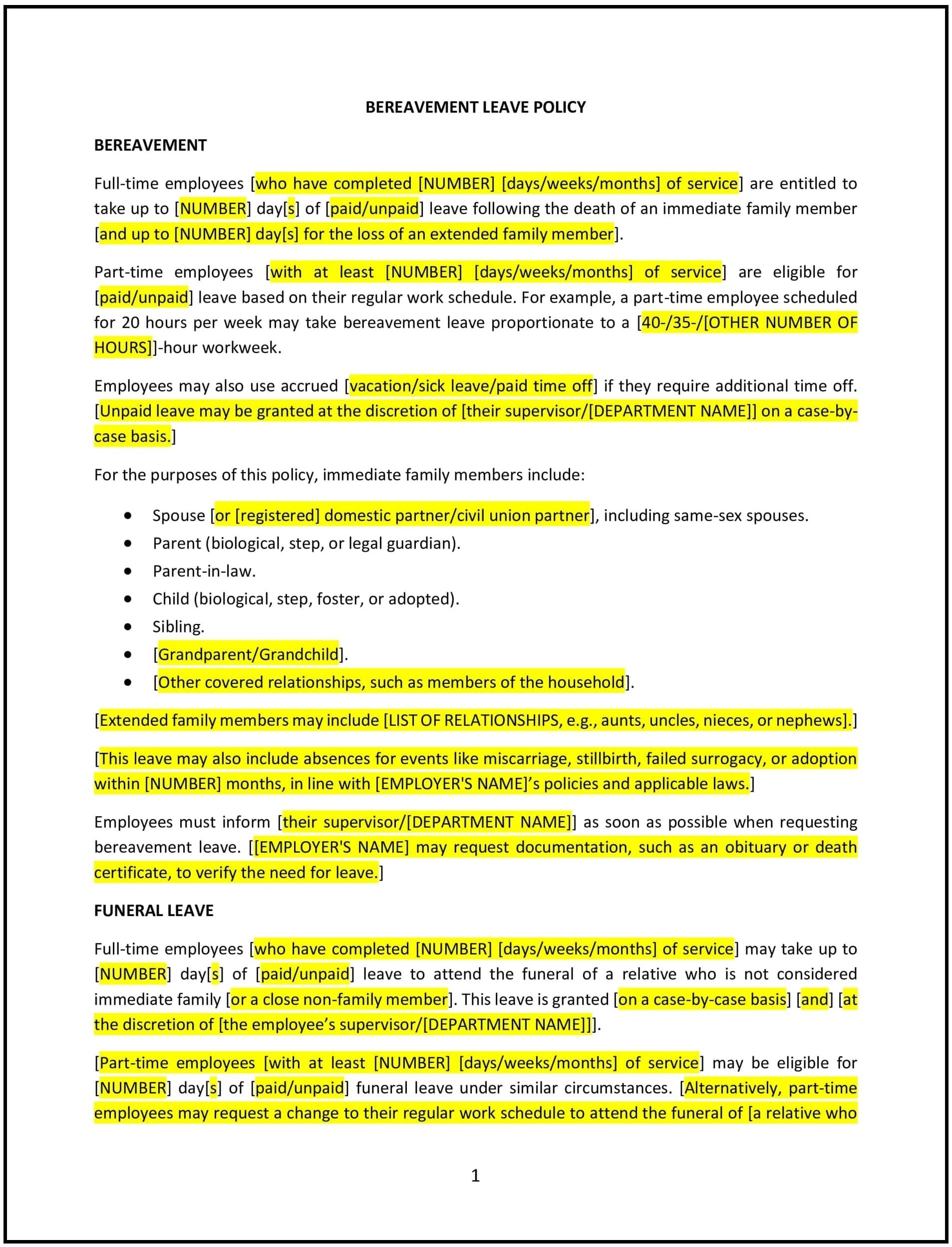Bereavement leave policy (Massachusetts): Free template
Got contracts to review? While you're here for policies, let Cobrief make contract review effortless—start your free review now.

Customize this template for free
This bereavement leave policy is designed to help Massachusetts businesses support employees during times of loss by providing time off following the death of a family member or close relative. The policy outlines the company’s approach to bereavement leave, including eligibility, duration, and the process for requesting time off. The company’s commitment to supporting employees during difficult times helps maintain a compassionate and productive work environment.
By adopting this policy, businesses can foster a culture of care, improve employee morale, and strengthen compliance with Massachusetts state laws and federal regulations regarding time off for bereavement.
How to use this bereavement leave policy (Massachusetts)
- Define eligible family members: Specify which family members or close relatives qualify for bereavement leave. Common eligible relationships may include parents, children, spouses, siblings, grandparents, and in-laws. Consider whether the policy will cover extended family members or close friends in specific cases.
- Set the duration of leave: Define the length of time employees are entitled to take off following a death. This may range from one to five days of paid or unpaid leave, depending on the company’s policy and the relationship of the employee to the deceased. The policy should address whether additional leave can be requested or if employees may use other leave types (e.g., vacation or personal leave) for extended mourning periods.
- Outline leave request procedures: Establish a process for employees to request bereavement leave. This should include the notice period required (e.g., notifying the employer as soon as possible), any documentation required (e.g., a death certificate or obituary), and the procedure for submitting requests (e.g., by email, phone, or in writing).
- Address special circumstances: Consider whether to offer additional leave for employees who need to travel long distances or handle related administrative matters. The policy can provide options for flexible work arrangements or additional unpaid leave for such cases.
- Ensure consistency with Massachusetts state laws: Ensure the policy complies with Massachusetts state laws governing time off for bereavement, including any legal requirements for paid leave. While Massachusetts does not mandate bereavement leave, businesses may choose to provide paid or unpaid leave to employees based on company policies and union agreements.
- Ensure privacy and sensitivity: Emphasize the importance of handling bereavement leave requests with sensitivity and respect for the privacy of the employee. The policy should stress that personal or sensitive information related to the leave will be kept confidential.
Benefits of using this bereavement leave policy (Massachusetts)
This policy offers several benefits for Massachusetts businesses:
- Supports employees during difficult times: Providing bereavement leave helps employees cope with the emotional and practical challenges following the loss of a loved one, ensuring they have time to grieve and handle personal matters without the added stress of work responsibilities.
- Enhances employee morale: By demonstrating empathy and understanding during tough times, businesses can build loyalty and trust with employees, leading to improved morale and overall satisfaction.
- Increases retention: Offering bereavement leave as part of a comprehensive benefits package can enhance employee retention by showing that the company values its employees’ well-being.
- Reduces workplace disruption: By offering time off for grieving, businesses can reduce the likelihood of distractions and reduce workplace disruptions caused by employees struggling with their grief.
- Supports legal compliance: Providing bereavement leave ensures that the company meets the expectations for employee leave and complies with any applicable Massachusetts state regulations regarding employee benefits.
- Demonstrates a caring workplace culture: A well-defined bereavement leave policy signals to employees that the company cares about their personal well-being, fostering a culture of respect and support.
Tips for using this bereavement leave policy (Massachusetts)
- Communicate the policy clearly: Ensure that all employees are aware of the bereavement leave policy, how to request leave, and the company’s expectations for notifying supervisors in advance. This can be included in employee handbooks, orientation sessions, and internal communications.
- Offer flexibility when possible: While the policy should set a clear timeframe for bereavement leave, consider offering flexibility for employees who may need additional time for travel or other related tasks.
- Apply the policy consistently: Ensure the policy is applied consistently to all employees, regardless of their position or tenure, to avoid perceptions of favoritism or inequity.
- Respect employees’ privacy: Handle bereavement leave requests with sensitivity and confidentiality, respecting employees’ personal and emotional needs during difficult times.
- Review and update regularly: Periodically review the policy to ensure it aligns with Massachusetts state laws, company practices, and the evolving needs of employees. Update the policy as necessary to address changes in legal requirements or operational needs.